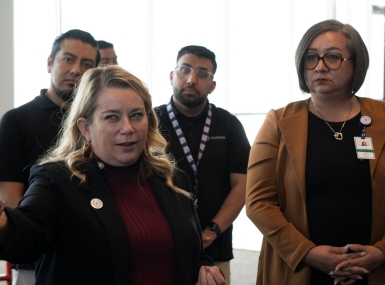Focusing on Better Beginnings
Upcoming Events
Related News

Dane County has invested $1.5+ million in Early Childhood Initiative sites and Early Childhood Zones to provide visitation programs, prenatal and kindergarten services
Counties provide a myriad of services that affect early childhood development. The roles of counties may vary because of state or local statutory requirements and structural differences in service delivery, but all counties impact children and families in ways that span geographic and demographic differences.
County responsibilities and opportunities related to early childhood development often fall into the following areas:
- Early development stage (0-3) services: Many counties have responsibility for services and support delivered before children enter school. This provides a limited window to provide early learning, nutrition and other forms of infant and toddler care services to support early development.
- Family and community support: All counties have some level of responsibility for programs and services that affect families and the community. Recognizing that family and the surrounding community has a significant impact on a child’s development can help drive county investment in economic development, job training, supplemental child care and other services that help strengthen a child’s environment and family unit.
- County-administered public education system: In limited cases, counties administer the public-school system. These counties have the opportunity to engage children in services and supports through the public-school system, including pre-K, supplemental nutrition programs, after-school programs and other early learning programs. Counties that run their public-school systems can maintain the continuity of supports through the early development stage (0–3) and throughout adolescence with direct services and programs.
The featured jurisdictions here show that counties are focusing on children and families. Poverty and family opportunity are common themes in many counties that initiate early childhood development efforts The featured counties, and many others, leverage existing resources and implement innovative programs and services to make upstream investments in the well-being and opportunity for children and families.
The opportunity for change
Hoping to ensure good outcomes for children by kindergarten, address intergenerational poverty, create environments for positive role models and understanding how brain development in early childhood is critical, Dane County, Wis. established Early Childhood Initiative sites. The sites were located in high–risk neighborhoods to provide an array of services for pregnant women or families with a child or children under 1-year old. The county saw an opportunity to build upon an established home visiting program and its role in administering the Birth to 3 Program, a partially-funded state program.
Dane County’s model
To serve more families and young children, the county established the Early Childhood Initiative (ECI) sites and followed up with an intensive Early Childhood Zones (ECZ) program that provides a home visitation program along with prenatal and kindergarten services, and acts as a hub around which other services are accessed and provided including housing, employment and training. These sites are also associated with the Joining Forces for Families initiative that brings together numerous community stakeholders.
These efforts have also provided an opportunity in one zone to enhance services at a single location shared by service providers within the neighborhood. Additionally, the county is implementing neighborhood navigators with assistance from a community foundation, to help community members access services and supports. Mental health services have also been enhanced in the ECZs for children and families.
Dane County has invested over $1.5 million in the ECI and ECZ efforts. The county has also been successful in blending funding from federal, state, philanthropy and other community partners to expand services, and reach more children and families.
Though school districts are engaged, and a new community school pilot implemented in two ECZs has been initiated, there is inadequate funding to deepen engagement. The county continues to identify new partnerships and there is some promise to new opportunities with the faith community and businesses.
Other Dane County programs
- Birth to 3 — An early intervention program for infants and toddlers who have developmental delays and disabilities, and their families. Dane County supports parents as they work toward the developmental outcomes parents want for their children. This program is a state program administered by counties in Wisconsin.
- Joining Forces for Families — This is a county-run initiative that brings together core teams comprising law enforcement and school personnel, a public health nurse, county social worker, and a community support specialist to support safer and healthier places to live. The community-based support team engages families to identify needed services and links them to services that maintain family stability and avoid costly system interventions.
- Nurse Family Partnerships — Though this program has a narrow eligibility window, it provides home visitation services during pregnancy until the child is 2 years old. Referrals are often made for families in the ECI or ECZ programs to enhance access to services.
- Born Learning — This partnership between Dane County and United Way provides educational resources to families, caregivers, community leaders and policymakers. Educational materials provide insight into childhood development and how to use “everyday moments” to help children start school ready to succeed.
The future of early childhood development in Dane County
The county has partnered with the University of Wisconsin to collect and analyze data, and will establish performance standards and agreed upon developmental milestones. They will also identify indicators that impact families such as stable housing and employment. As with many data–driven approaches, the county has identified challenges in collecting and utilizing data for decision–making and performance.
Privacy issues, engagement with the appropriate community stakeholders, data-sharing agreements and a data platform are all pieces critical in setting up data processes yet pose challenges in moving forward. The county understands that incorporating this into their work will provide opportunities to demonstrate models as best practices along with decision – making on where resources may be best allocated.
Dane County has made strides in enhancing their early childhood development efforts, they continue to grapple with enough resources to scale these efforts, there continues to be a chronic housing shortage and a large undocumented population. However, they continue to move toward their goals of breaking the cycle of poverty and transitioning from data collection to evaluation. They are dedicated to ensuring children are entering school ready to learn and demonstrating family economic stability has improved.
Quick tips for other counties
Communities looking for collective impact may approach other government and private agencies engaged in early childhood services to see how to best put families at the center of services through coordinated efforts.
Look for evidence-based models for delivering services to families.
Look for obvious ways to bring together professionals from various agencies to support each other in practice and to explore best practice theories and innovations. Dane County and partners have a quarterly Community of Practice for all home visitors.
Berea College
Appalachia, Kentucky
Berea College, located 35 miles south of Lexington, Ky., is home to Partners for Education (Partners) an organization dedicated to improving educational outcomes throughout Appalachia. As part of that work, Partners for Education advises 10 counties on their efforts in the Promise Neighborhood and Promise Zone programs. While Partners uses a cradle-to-career model, its early childhood education work focuses on ensuring that all children enter kindergarten ready to learn.
To achieve this result, Partners engages children and families to: 1) increase participation in Head Start and early Head Start; 2) strengthen families and reduce home stress; and 3) improve early childhood education methods. The 10 counties participating in the initiative are: Bell, Clay, Hardin, Jackson, Knox, Leslie, Letcher, Owsley, Perry and Whitley.
The 10-county area faces many challenges including high rates of unemployment, teenage pregnancy and homelessness among the 0–5 age group and among parents under age 24 who have young children. Family instability is further increased by substance abuse which has led to grandparents’ raising young children. Participation in two federal programs, the U.S. Department of Education Promise Neighborhoods and U.S. Department of Housing and Urban Development Promise Zones provided a platform to focus on kindergarten readiness and engage families and community stakeholders.
Although the region struggles with a tax base not adequate to support programs, this rural region has the capacity to develop strategies and find partners willing to work together to utilize resources appropriately. The multi-county effort also has strong engagement from community partners, the faith community, the business sector and philanthropy.
Multi-county initiative
The multi-county effort includes activities aimed at enhancing cradle-to-career opportunities. The early childhood education focus has been on supporting children to become kindergarten ready. Partners uses a variety of programs and activities to meet this need. In some areas, it works to enhance teacher effectiveness by funding the technology needed to provide supportive supervision, while in other areas the focus is on bringing services to the family. That can mean working with the utility company to insert childhood development messages in monthly billing statements, or using the Vroom program also to get technology into the hands of parents and families. In Clay County, Partners was able to use private dollars to fund two Readiness Buses, “Sunny” and “Rosie,” which provide age-appropriate learning opportunities for children while also assisting with the needs of parents.
A typical readiness bus visit will include guided reading for the child and the chance for the parent to work on obtaining a GED or receiving career counseling. The effort aims to help two generations: grandparents raising children and high-school students with children.
Kentucky also has early childhood councils in each county. This provides partnership opportunities across various sectors to assess current efforts and to reach early childcare providers and social service agencies.
Home visiting
Home visiting is a key component of engaging children and their families in the Partners for Education model and the foundation of the cradle to career pipeline. A key partner in this work is Save the Children, a national nonprofit focused on healthy children. Early Steps to School Success (ESSS), Save the Children’s home visiting program, serves the “neediest and the youngest” members of the community.
Partners for Education helped scale up this work to serve more families and created a program to transition those students from the home environment into kindergarten. Each early childhood specialist had a caseload of children who they transitioned from Save the Children’s home visiting program to kindergarten by providing in-class instruction and home visits.
The program ensured the children exiting ESSS sustained the gains in language development made during the first three years and, as a result, were able to increase readiness in other developmental domains.
Outcomes
Expanded the reach of Save the Children’s home visiting program to 10 elementary schools serving 50 children each (500). Previously, only four schools were served.
Approximately 400 children were impacted through the increase in the quality of preschool and Head Start classrooms (environmental enrichment and teacher coaching).
Provided oral health training to 200 families increasing their knowledge and skills in nutrition and caring for children’s teeth.
Future of early childhood development
As many of the grants that supported the work done by Partners for Education come to a close, there are opportunities to find new funding streams and to encourage local communities to develop sustainable sources funding.
The challenges facing rural areas include problems accessing services, a lack of data infrastructure, shortages of local personnel with the qualifications and skills to do this work and low pay.
However, the future of the region depends on supporting access to high-quality, center-based early childhood education for all children in the community.
Partners for Education seeks to build a coalition of county judge executives, mayors, superintendents and other local officials to spearhead this work. Some local officials have already indicated their support based on the realization that if no investments are made, than the future for their communities is bleak. Using data-driven solutions, these communities have the chance to “turn the curve” in a positive direction.
Quick tips for other counties
Be aspirational when you think about the services that should be available to all children in the community.
Be realistic about data and set measurable targets. Connect with other initiatives to share data.
Assess what is already happening in the community and how can you leverage existing efforts instead of creating new infrastructure.
Attachments
Related News

El Paso County, Texas helps migrants on their way
Though they don't often stay more than a day, asylum seekers receive care and services from El Paso County, Texas before they leave for their next destination.

L.A. County fends off homelessness with an assist from A.I.
A predictive model pulls data from six county departments to create a list of the county’s most vulnerable population — people who frequently show up in the county’s criminal justice and hospital systems and who access benefits like SNAP.
